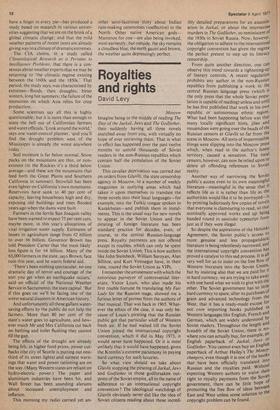Royalties and rights
David Levy
Moscow Imagine being in the middle of reading The Day of the Jackal, Jaws and The Godfather, then suddenly having all three novels snatched away from you, with virtually no hope of ever retrieving them. That is what in effect has happened over the past twelve months to untold thousands of Soviet readers in the non-Russian republics which contain half the population of the Soviet Union.
This cavalier deprivation was carried out on orders from Glavlit, the state censorship agency in Moscow, to a number of weekly magazines in outlying areas which had taken it upon themselves to translate the three novels into their local languages—for example, into the Turkic tongue spoken in Kazakhstan—and publish them in instalments. This is the usual way for new novels to appear in the Soviet Union and the pirating of foreign literature has been standard practice for decades, even, of course, in the central Russian-language press. Royalty payments are not offered except in roubles, which can only be spent inside the Soviet Union; This is how authors like John Steinbeck, William Saroyan, Alan Sillitoe, and Kurt Vonnegut have, in their time, toured the Soviet Union as VIPs.
!remember the amusement with which the notorious purveyor of controversial literature, Victor Louis, who also made his first rouble fortune by translating My Fair Lady for the Russian stage, showed me a furious letter of protest from the authors of that musical. That was back in 1965. Whatever the ethics of the case, it was only because of Louis's pirating that the Russian public got that particular whiff of Western fresh air. If he had waited till the Soviet Union joined the international copyright convention, which it did in May 1973, it would never have happened, Or it is most unlikely that it would have happened, given the Kremlin's extreme parsimony in paying hard currency for such luxuries.
So what view should we take about Glavlit stopping the pirating of Jackal, Jaws and Godfather in those godforsaken outposts of the Soviet empire, all in the name of adherence to an international copyright convention? The ideological watchdogs of Glavlit obviously never did like the idea of Soviet citizens reading about those incred
ibly detailed preparations for an assassination in Jackal, or about the internecine
murders in The Godfather, so reminiscent of
the 1930s in Soviet Russia. Now, however, the obligation to adhere to the international
copyright convention has given the regime the perfect pretext to step up its literacy censorship.
From quite another direction, one can observe this trend towards a tightening-UP of literary controls. A recent regulation prohibits any author in the non-Russian republics from publishing a work in the central Russian language press (which is
the only press that the whole Soviet population is capable of reading) unless and until
he has first published that work in his own republic or autonomous ethnic region. What had been happening before was that many locally significant hints, jibes and innuendoes were going over the heads of the Russian censors at Glavlit so far from the scene in Moscow. All sorts of impermissible things were slipping into the Moscow press which, when read in the author's home territory, caused a sensation. The local censors, however, can now be relied upon to delete all offending references to Soviet reality. Another way of narrowing the Soviet public's access even to its own meaningful
literature—meaningful in the sense that it reflects life as it is rather than life as the authorities would like it to be portrayed— by printing ludicrously few copies of novels that everyone is clamouring to read, so that
nominally approved works end up being handed round in sainizdat typescript form just as if they were illegal. So despite the aspirations of the Helsinki Agreement, the Soviet public's access to
more genuine and less propagandistic
literature is being relentlessly narrowed, and the international copyright convention has proved a catalyst to this sad process. It is all
very well for us to insist on the free flow of Western literature into the Soviet Union, but by insisting also that we are paid for it
in hard currency, we are trying to take away with one hand what we wish to give with the other. The Soviet government has so little hard currency to spare, after its purchases of grain and advanced technology from the West, that it has a ready-made excuse for not even importing books published in Western languages like English, French and German, which are widely understood bY
Soviet readers. Throughout the length and bteadth of the Soviet Union, there is no where you can actually buy, for example, 311
English paperback of Jackal, Jaws of Godfather. You cannot even buy an English paperback of Arthur Hailey's The Moncr changers, even though it is one of the books that have been officially translated itot Russian and the royalties paid. Withou. expecting Western authors to waive their right to royalty payments from the Soviet f f government, there can be little hope o promoting the free flow of ideas between East and West unless some solution to the copyright problem can be found.
































 Previous page
Previous page